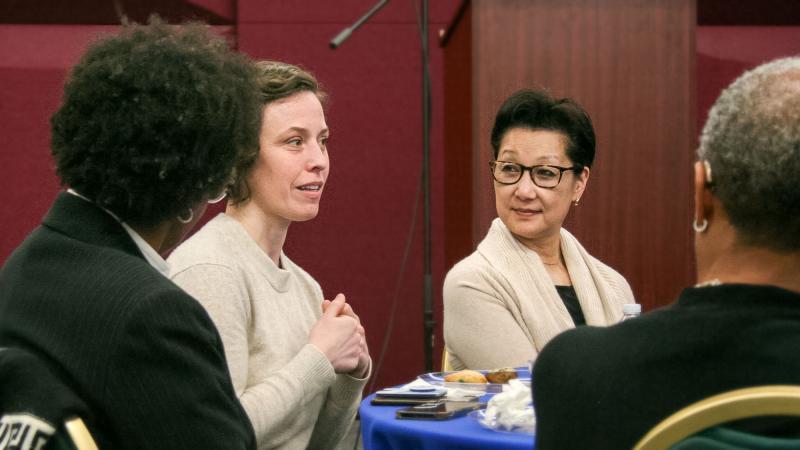
Creating Community for Shared Growth and Learning
Optimizing Our Surgeons
At Duke Surgery, ‘community’ means more than just our surroundings. By creating safe spaces in which to share experiences with colleagues and garner support through commonalities, our Duke surgeons are strengthening each other more than ever before.
Innovative programs and initiatives seek to look deeper within ourselves and assess the humanistic values of surgery. Faculty are leading surgical education into a new era of support and mentorship, while we also look outwardly to the community around us to engage with future surgeons in exciting new ways.
Our faculty's and trainees' deeper engagement with the profession and each other is setting a new standard for what it means to be a good surgeon.
Room for Improvement • Space to Be Human : The Akwari Society , The Project on the Good Surgeon , SEEDS • Building a Brighter Future
Room for Improvement
Supporting the development of exceptional surgical technique has long been at the core of the Duke Surgery mission. As surgical tools and approaches advance, our training programs adapt and advance with them, keeping Duke surgeons on the cutting edge of clinical excellence.
No where on campus is this evolution and impact more evident than in the Surgical Education and Activities Lab (SEAL).
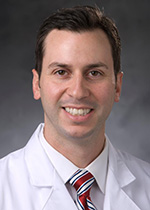
Associate Professor of Surgery, Division of Surgical Oncology
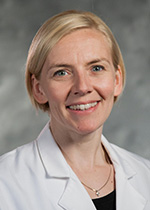
Assistant Professor of Surgery, Division of Surgical Oncology
Led by K. Louise Jackson, MBBS, Assistant Professor of Surgery, and Sabino Zani, MD, Associate Professor of Surgery, of the Division of Surgical Oncology, SEAL utilizes a range of simulation models and technology to provide a comprehensive, risk- and judgment-free learning environment in which to practice surgical techniques.
SEAL primarily supports residents and fellows, promoting the development and maintenance of technical skills through increasingly innovative means, such as impressively realistic models thanks to a new 3D printing system or friendly competitions on the robotic simulator against the University of North Carolina - Chapel Hill residents. However, all levels of surgical care providers are welcome and supported in SEAL.
The robust robotics curriculum extends to med students, building familiarity and confidence with the console controls before they even set foot in the robotic operating room. Collaborations with the surgical nursing teams bolster intraoperative technical support. Even our highly skilled faculty have found room to grow with the support of SEAL.
“It's very difficult to learn new technical skills as faculty, but I think there’s opportunity for us to learn from each other.”
- Louise Jackson, MBBS
In a novel education initiative, the SEAL team invited Duke colorectal surgery faculty to share and discuss their technical approaches for robotic colectomies with one another. The primary goal was to encourage peer-to-peer learning, but the collaborative environment demonstrated the value of another skill: asking colleagues for feedback.
“It's very difficult to learn new technical skills as faculty, but I think there’s opportunity for us to learn from each other,” says Dr. Jackson. “So, we invited our faculty to the vivarium with the robot and spent three hours going through technical skills in a peer-coaching, Q&A format.”
After the session, attendees were asked to complete a post-event survey. “While some admitted they had not been looking forward to the lab, they enjoyed it and found it valuable,” adds Dr. Jackson. “Many felt that they would be more willing to ask their peers for help in the future.”
“Duke is not about bringing you up to baseline. Here, we aim for technical excellence.”
- Louise Jackson, MBBS
Enabling constructive feedback is what SEAL does best. Whether it’s a medical student encountering laparoscopic instruments for the first time, a resident working to master a particularly challenging skill, or a faculty member simply looking for a new perspective, the SEAL team is there to provide the space, resources, and tailored support to advance the skills of Duke surgeons.
“Duke is not about bringing you up to baseline. Here, we aim for technical excellence,” agrees Dr. Jackson.
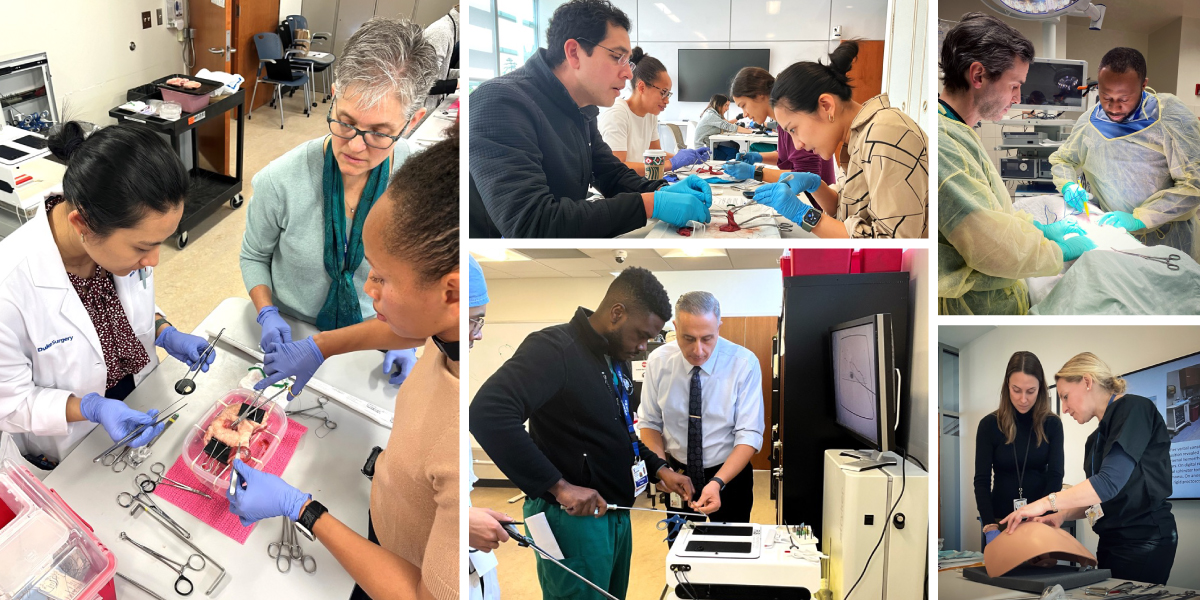
Space to be Human
While mastery of the technical skills of surgery is vital to the profession, of equal impact and importance is maintaining connection to one’s own humanity in an often heavily taxing field.
“As surgeons, we see and experience things on a daily basis that are completely outside of the normal human existence, and after a while, some of those things can take a toll on you,” shares Tamara Fitzgerald, MD, PhD, Associate Professor of Surgery in the Division of Pediatric General Surgery and instrumental member of The Akwari Society.
“Vulnerability and connection with people are sources of strength.”
- Tamara Fitzgerald, MD, PhD
“And, I think, as with all intense professions, if you don't provide a space for people to be able to meet in their intensity and talk about it, for people to have a community and a support structure, you won't be able to sustain that intensity,” she continues. “Vulnerability and connection with people are sources of strength.”
In short, the unique experience of being a surgeon requires unique support systems, and the recent expansion of initiatives to meet these needs have proven essential to Duke Surgery’s enduring success.
The Akwari Society
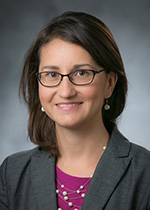
Associate Professor of Surgery, Division of Pediatric General Surgery
Established in 2022, The Akwari Society continues to build upon the legacy and philosophy of Dr. Onyekwere Emmanuel Akwari, a champion of compassion and support for the human experience at the core of surgical care.
In support of ‘the surgeon as a person: honoring our own humanity,’ one of three central tenets of the Society, Dr. Fitzgerald and her colleagues in The Akwari Society are organizing meaningful events that create space for our surgeons, at all career levels, to connect with one another and share in their common experiences.
“There's something about our role that's just very intense and very special; for some things, our colleagues are the only ones that really understand what it's like,” explains Dr. Fitzgerald. “And I think people do want to talk about it; there just needs to be a safe space to facilitate that conversation among peers, a forum where we can be transparent with one another.”
The Akwari Society is also working to boost broader discourse and perceptions under its second tenet, ‘the surgeon as a human in the public forum,’ through a podcast series in partnership with Behind the Knife. Interviews with Duke faculty highlight meaningful experiences across their careers, sharing moments of when they felt most human or that they had briefly lost their humanity while providing surgical care, in hopes of breaking down stereotypes and demonstrating the depths of their humanistic connection to their patients and their work.
Residents are also invaluable members of The Akwari Society, contributing to many initiatives and driving efforts under the third tenet: ‘the privileged human connection of the patient-surgeon relationship.’ In the coming years, the Society hopes to develop tools and opportunities for faculty and trainees to share appreciation for and connect with their patients on an even more personal and humanistic level.
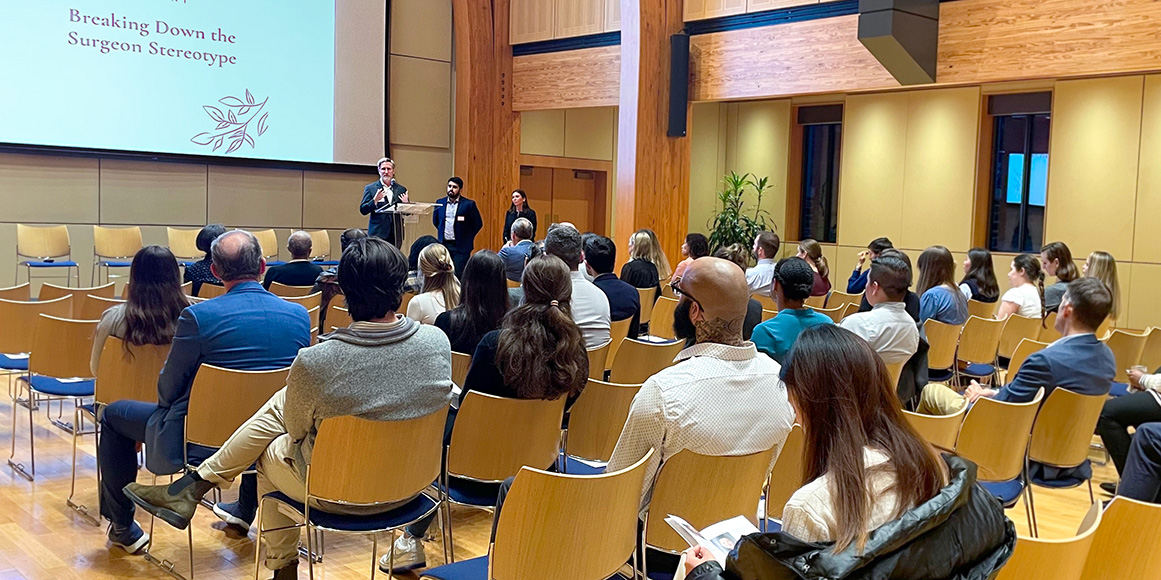
The Project on the Good Surgeon
Maintaining a sense of purpose, self, and humanism is particularly important for our residents as they navigate the stress and challenges of learning a vast range of high-stakes skills while on the job.
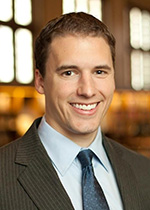
Assistant Professor of Surgery, Division of Pediatric General Surgery
To address this foundational need for support systems that develop moral capacity alongside technical skills in surgical education, The Project on the Good Surgeon continues to create space for residents to connect and define for themselves, what it means to be a “good surgeon,” beyond technical expertise.
Driven by an annually rotating resident lead and supported by Ryan Antiel, MD, MSME, Assistant Professor of Surgery in the Division of Pediatric General Surgery, the Project entered its second year of impactful programming and growth in 2024.
Through regular social gatherings and small group discussions with their peers and invited speakers, such as Duke Men’s Basketball head coach, Jon Scheyer, residents are afforded moments of devoted discussion, introspection, and opportunity to identify and develop characteristics of success that resonate with them. The Project also facilitates one-on-one mentorship to residents, that allows them to further build upon these aspects of their professional development.
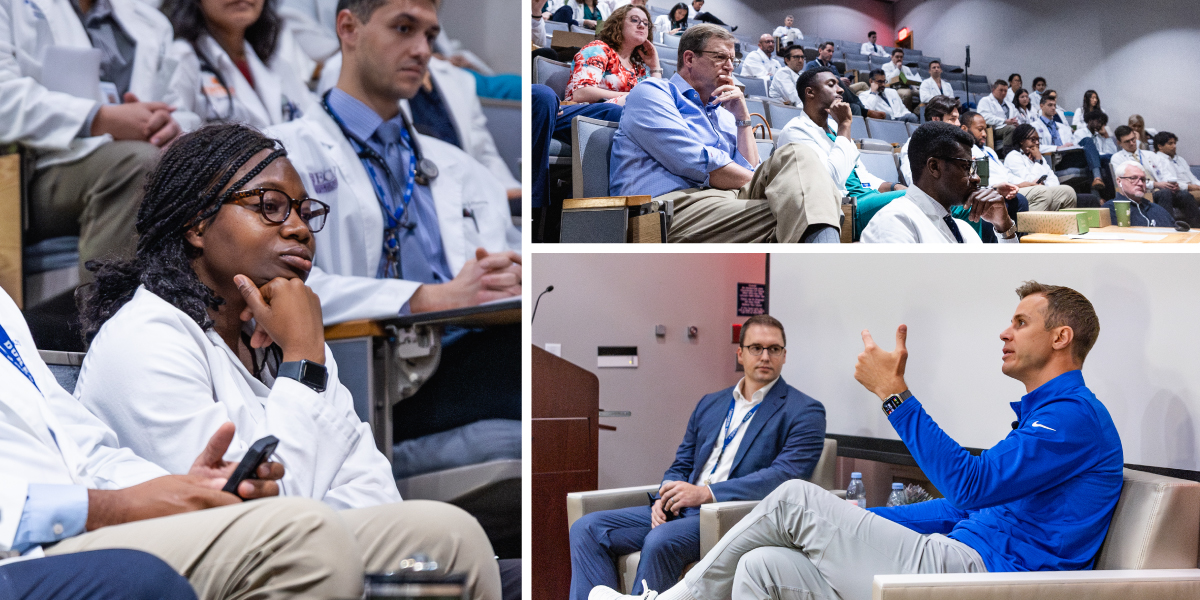
Building a Brighter Future
Through these initiatives and more, Duke Surgery is redefining what it means to be an exemplary surgeon, and opening doors for prospective, highly qualified surgeons that may have otherwise thought the field was out of reach.
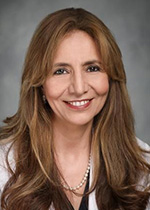
Professor of Surgery; Division of Plastic, Maxillofacial, and Oral Surgery
The Academic Success Through Surgical Education and Training (ASSET) program continues to engage and inspire the next generation of surgeons at the elementary and middle school level. Since its inaugural event in 2015, the ASSET program has connected with over 300 students through local schools and youth program partnerships, such as the Durham Nativity School and StrongHER TogetHER, to provide hands-on workshops that foster curiosity and interest in surgical professions.
Led by Linda Cendales, MD, Professor of Surgery in the Division of Plastic, Maxillofacial, and Oral Surgery and a team of volunteer faculty, OR nurses, trainees, and staff, the ASSET program guides students through a range of surgical activities, from gowning and gloving to instrument handling and suture practice, to trying their hand at the robotic surgery simulation modules in SEAL. At the end of the day, the ASSET team hopes these students leave the sessions with a broadened perspective of the future careers they are capable of, and that they someday return to campus among the ranks of Duke Surgery.
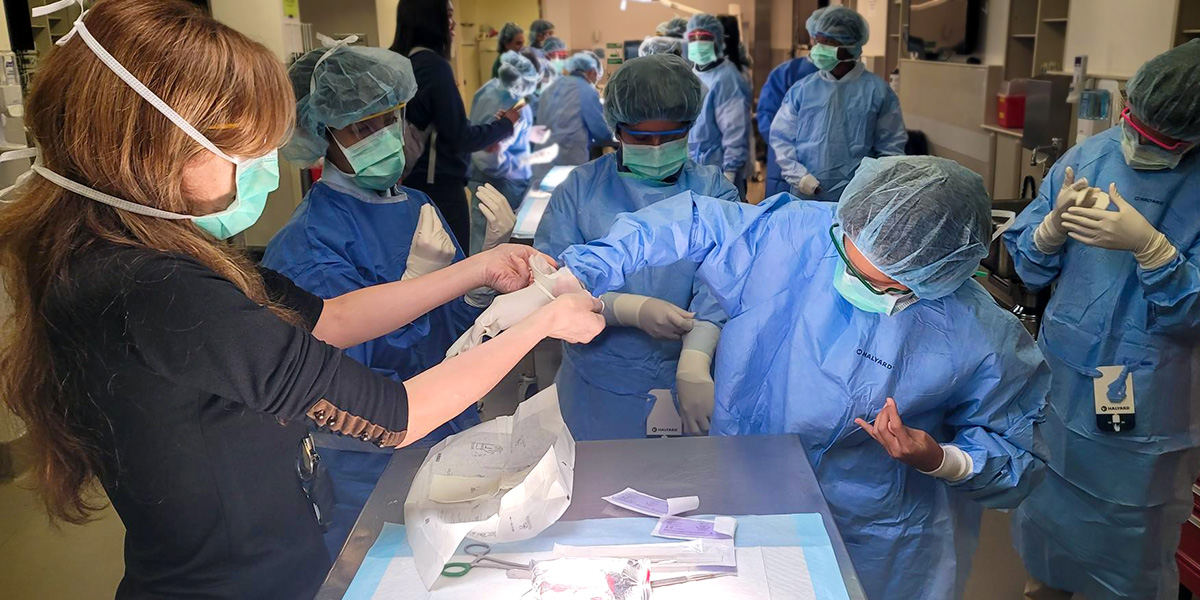
From prospective trainees to our most experienced faculty, Duke Surgery is building communities of support and growth at all levels of the surgical profession.
In a field historically perceived as intimidatingly intense and emotionally disconnected, Duke Surgery is turning the page, creating space to slow down and connect, to make room for vulnerability, compassion, and fellowship and be strengthened by it.
The excellence of Duke’s surgeons extends well beyond their individual operative techniques; it is their commitment to shared growth and community that drive Duke Surgery forward as a leading institution toward a stronger, brighter future of surgical care.